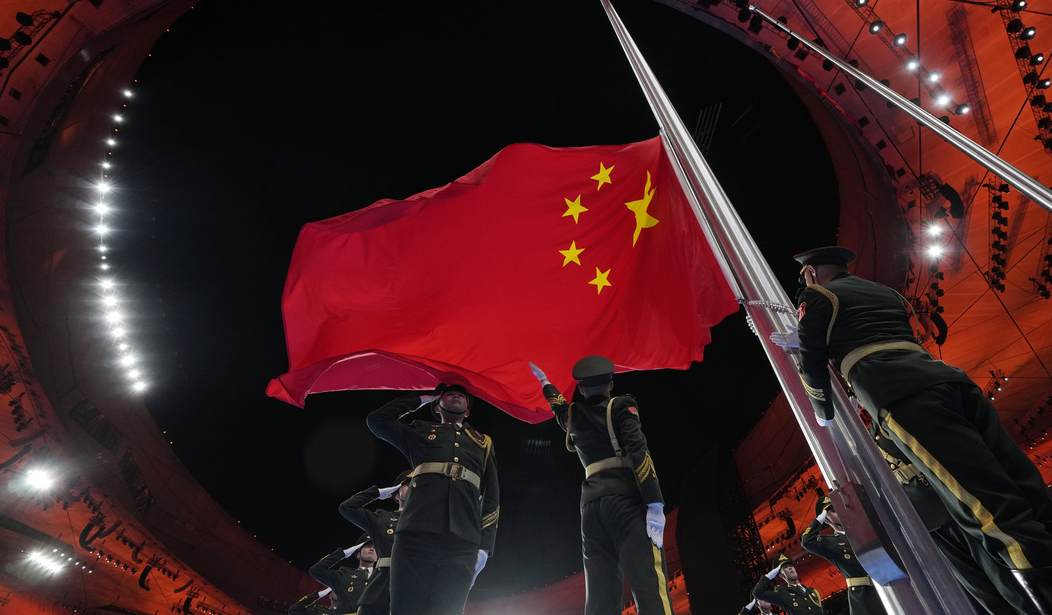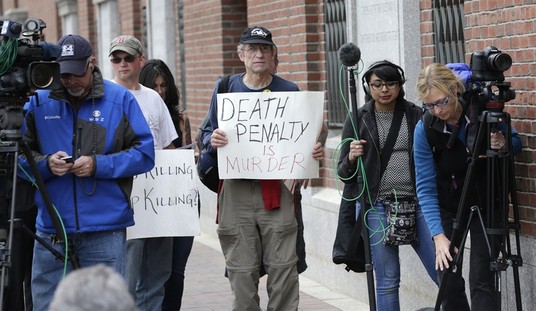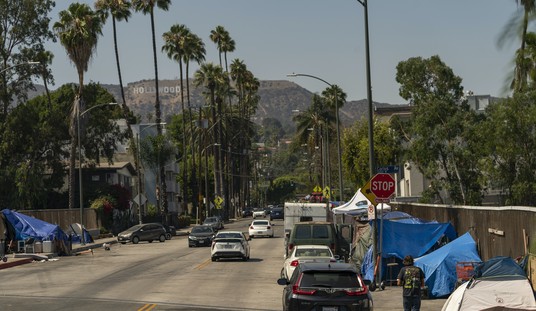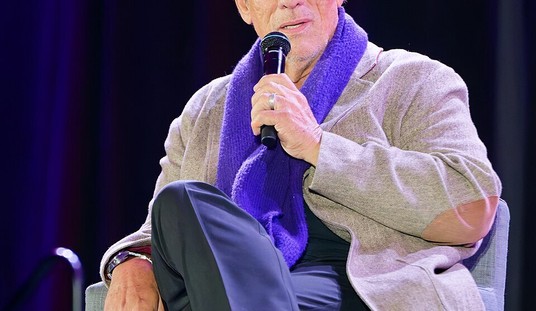China presents a double-edged sword for studios, publishers, and other content producers. On the one hand, it’s a huge market for movies, books, and shows; on the other hand, it’s a repressive, censorious regime. Our cultural betters often find themselves torn between profits and censorship — in other words, between the green and the red.
Time and again, we’ve seen cultural tastemakers run up against a red buzzsaw in the form of China. Disney has notoriously changed the content of some of its movies to appease Chinese censors, and notable films like “Skyfall,” “Bohemian Rhapsody,” and “Titanic” faced content changes for the Chinese market.
One big bright spot in the content war with China was “Top Gun: Maverick.” Early promo stills from the blockbuster showed altered versions of the Taiwanese and Japanese flag patches on Maverick’s jacket, but cooler and more patriotic heads prevailed and the original patches appeared onscreen.
This Chinese censorship influence showed up in a massive way at the 81st World Science Fiction Convention — Worldcon for short — which took place in October 2023 in Chengdu, China. An astonishing new report details the censorship that took place at Worldcon and how it affected the prestigious Hugo Awards.
Chris M. Barkley and Jason Sanford reported at File 770 how the whole debacle went down. (Confession: this is a new world for me as my sci-fi knowledge only consists of Star Wars and C. S. Lewis’ Space Trilogy. I’m relying heavily on Barkley and Sanford here, but bear with me if I reveal my sci-fi ignorance.)
This bizarre story actually begins at the 79th Worldcon in D.C. in 2021. During the fan vote to determine where the 81st Worldcon would take place, a preponderance of votes from Chinese fans pushed Chengdu to win over Winnipeg, Canada. Bloc voting isn’t out of the ordinary, but a “majority of the ballots from China had email addresses and not the traditional street addresses that fans in other parts of the world usually provide.”
The intervening time between the vote and 2023’s Worldcon included “long periods of silence” punctuated by the announcement of guests of honor for the Chengdu convention, including a Russian author who is an outspoken partisan of Vladimir Putin.
“In addition, the Chengdu Worldcon was heavily criticized because it was being held under the auspices of an authoritarian regime which regularly spied on, discriminated against or jailed political dissenters, religious minorities, writers, artists, booksellers and publishers,” Barkley writes. “There were also allegations that the government was colluding with business interests to build the venue the convention would be held in. The delays in the construction of the facility moved the date of the start of the Worldcon from early August to mid-October.”
For the most part, these concerns turned out to be for naught. Worldcon went off with minimal problems. The venue garnered rave reviews, attendees enjoyed the panels, and the Hugo Awards ceremony went smoothly. But one big problem loomed over the convention.
Barkley points out that the long list of nominations for the Hugo Awards and the results of the final voting normally make their way into the hands of the public shortly after Worldcon, but the committee didn’t release the 2023 list until Dec. 3 with no explanation for the delay. The long list didn’t make the Hugo Awards website until Jan. 20.
“There was a firestorm of outrage, condemnation, speculation, and rumors of malfeasance surrounding the absence of the works of novelist R.F. Kuang (Babel), screenwriter and producer Neil Gaiman (The Sandman), fan writer Paul Weimer, and Xiran Jay Zhao — who would have been an Astounding Award nominee for Best New Writer — despite having enough nominations to make the Final Ballot,” he writes.
This curious turn of events led Barkley and Sanford to dig and find out the reason behind the notable omission of important works from 2023 and discover why the nomination list and voting result were delayed. Hugo Awards head administrator Dave McCarty made the only official statement about the awards: "After reviewing the Constitution and the rules we must follow, the administration team determined those works/persons were not eligible.”
One of the 2023 Hugo Awards administrators revealed to Barkley and Sanford that “the rules we must follow” specifically related to “Chinese laws related to content and censorship.” Diane Lacey shared emails with Barkley and Sanford that detailed the censorship line the administrators had to toe.
The emails that Lacey provided involved the administrators discussing the award selection process. An email from McCarty dated June 5 stated:
In addition to the regular technical review, as we are happening in China and the *laws* we operate under are different…we need to highlight anything of a sensitive political nature in the work. It’s not necessary to read everything, but if the work focuses on China, taiwan [sic], tibet [sic], or other topics that may be an issue *in* China…that needs to be highlighted so that we can determine if it is safe to put it on the ballot (or) if the law will require us to make an administrative decision about it.
Kat Jones, who wasn’t an administrator for the 2023 Hugo Awards but was on the administrators’ list for 2024, was in on the email thread. Jones explained in a statement to Barkley and Sanford that she “conducted the eligibility research” for the 2023 administrators.
On June 5, she asked McCarty to provide resources about the “other topics that may be an issue *in* China.” McCarty replied that he would seek more guidance but that “mentions of Hong Kong, Taiwan, Tibet, negatives of China” were issues for the Chinese censors.
Barkley and Sanford continue:
On June 6, Kat Jones wrote an email to the administration group titled “Best Novel potential issues.” In the email, Jones raised concerns about the novels “Babel, or the Necessity of Violence” by R. F. Kuang and “The Daughter of Doctor Moreau” by Silvia Moreno-Garcia. Jones wrote that Babel “has a lot about China. I haven’t read it, and am not up on Chinese politics, so cannot say whether it would be viewed as ‘negatives of China’” while adding that “The Daughter of Doctor Moreau” talked “about importing hacienda workers from China. I have not read the book, and do not know whether this would be considered ‘negative.’”
“Babel,” which won the Nebula Award for Best Novel, ended up being deemed “not eligible” for the Hugo Awards despite having 810 nominations, more than enough to make the final ballot. “The Daughter of Doctor Moreau” was not removed from the ballot.
Lacey told Barkley and Sanford that the administrators left all of the books, television series episodes, and authors off the list because of pressure from the Chinese. They did so despite Lacey’s hopes that the team would conduct that year’s awards with integrity.
Lacey wrote a heartfelt and revealing apology letter, which begins:
Let me start by saying that I am NOT making excuses, there are no adequate excuses. I am thoroughly ashamed of my part in this debacle, and I will likely never forgive myself. But the fans that have supported the Hugos, the nominees, and those that were unfairly and erroneously deemed ineligible in particular, deserve an explanation. Perhaps the only way I can even begin to ease my conscience is to provide one.
The administrators discovered some collusion among readers of a Chinese publication, and they threw those ballots out. Lacey said that there were more issues with the Chinese government than she imagined, and she placed her faith in McCarty to handle them the right way. However, he “handled [them] so poorly.” She also said that McCarty also thought that the delay in releasing the list was prudent as a way to protect the Chinese “from the ensuing uproar.”
“As far as Dave’s apparent actions in cooking the results, I have to say I didn’t really expect that either,” Lacey wrote. “And if I had I, like many others have said, would have imagined he’d do a better job.” She added, “The fallout has negatively affected something I care deeply about, the Hugos, and I’m not sure they can recover,” and she concluded with another heart-rending apology.
Consequences have come down after this electrifying report. The World Science Fiction Society released a statement on Jan. 30 detailing some actions surrounding Worldcon Intellectual Property, which oversees the Hugo Awards:
- Dave McCarty has resigned as a Director of W.I.P.
- Kevin Standlee has resigned as Chair of the W.I.P. Board of Directors (BoD).
- W.I.P. has censured or reprimanded the following persons, listed in alphabetic order, for the reason given:
- Dave McCarty – censured for his public comments that have led to harm of the goodwill and value of our marks and for actions of the Hugo Administration Committee of the Chengdu Worldcon that he presided over.
- Chen Shi – censured for actions of the Hugo Administration Committee of the Chengdu Worldcon that he presided over.
- Kevin Standlee – reprimanded for public comments that mistakenly led people to believe that we are not servicing our marks.
- Ben Yalow – censured for actions of the Hugo Administration Committee of the Chengdu Worldcon that he presided over.
- Donald Eastlake has been elected Chair of the W.I.P. BoD.
Jones resigned from the 2024 Hugo Awards administrative team as well, even though she released a statement attempting to wash her hands of what happened at Chengdu.
Esther MacCallum-Stewart, chair of the 2024 Worldcon, which will take place in Glasgow, Scotland, issued a statement apologizing for what happened in 2023.
“I unreservedly apologise for the damage caused to nominees, finalists, the community, and the Hugo, Lodestar, and Astounding Awards,” she stated, adding, “I acknowledge the deep grief and anger of the community and I share this distress.”
MacCallum-Stewart has also vowed transparency for the next Hugo Awards selection and voting process. She has vowed, among other things, to “publish the reasons for any disqualifications of potential finalists, and any withdrawals of potential finalists from the ballot” and “publish a log explaining the decisions” that the administrators make. Hopefully, it will restore trust in the Hugo Awards.
Barkley concludes:
What remains unknown at this time is what was the extent of the involvement of the Chinese government or the business interests that surrounded the development of the Science Fiction Museum, if the business deals that emerged from the convention were orchestrated in conjunction with the convention organizers, a more detailed knowledge of the reaction from the SF fans in China, and whether or not there have been repercussions for them from this shameful incident.
One thing is for sure: it’s time for anyone who generates content to stop kowtowing to the Chinese regime and its insidious censorship machine. The only way China will stop censoring content is for content creators and publishers to stop bowing the knee.










